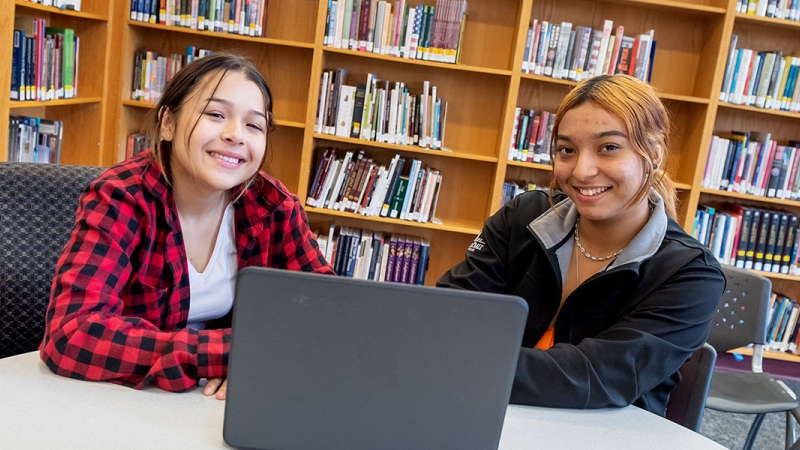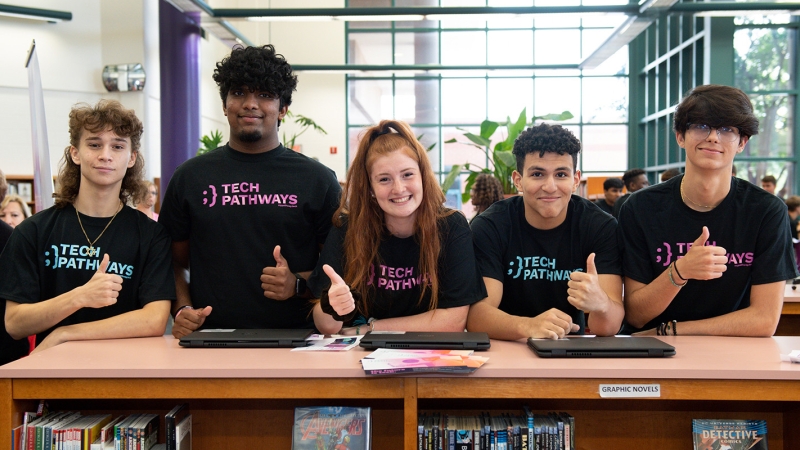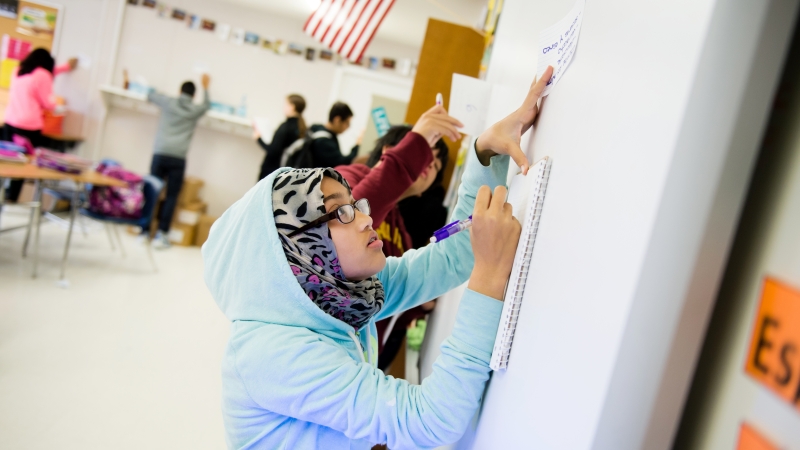
College Success Program Improvement and Innovation Plan
Relevant details and data for the College Success Programs
Program Overview
In accordance with FCPS Strategic Goals of Student Success, College Success Programs (CSP) uses a systemic approach to mitigate the impact of barriers to access, opportunity, and attainment and support students who are from populations that are historically underrepresented on college campuses due to adverse barriers. Some students face challenges caused by poverty, racism, and lack of access to resources. Many of our CSP students are:
- First in their families to attend college in the U.S.
- Students with disabilities.
- English language learners.
- Economically disadvantaged students; regardless of race and ethnicity.
College Success Programs:
- Prepare students to graduate on time and be college and career ready with equitable educational access to postsecondary education.
- Support CSP students through programs that equip students with the tools necessary for success in higher education.
- Promote college readiness by offering a variety of services that include:
- Preparing students for the academic rigor of college coursework.
- Helping with the college application and financial process.
- Field trips to college campuses.
- Goal setting and career exploration.
- Academic skill-building and monitoring of academic performance.
- Providing enrichment and leadership activities and experiences.
- Increase the number of students going to college or getting a career by building school, family and community partnerships that provide:
- College-related information
- Resources
- Support for students and families
- Support students graduating with post-secondary options.
- Help students as they transition from high school to college through our Launch to College program.
Launch to College Program
Many college-intending students find themselves dealing with summer melt, especially low-income students. Many high school graduates with plans to enroll in college find it difficult to stay on course due to:
- Insufficient financial aid
- Missed administrative deadlines
- Lack of support
This program is designed to ease the transition to college and support postsecondary success by providing students with academic skills and social resources needed to succeed in a college environment.
Overview
Advancement Via Individual Determination (AVID) is a national college readiness system. Their mission is to close the opportunity gap by preparing all students for college and career readiness and success. AVID’s goal is to make sure that students capable of completing a college preparatory path will:
- Succeed in accessing the most rigorous curriculum.
- Take part in leadership activities within their school.
- Increase their enrollment in and attendance at four-year colleges and universities.
AVID is a core program of College Success Programs (CSP) in FCPS that
- Uses a systemic approach to mitigate the impact of barriers to access, opportunity, and attainment.
- Supports students in graduating on time.
- Helps students be college and career ready with equitable access to postsecondary education.
The AVID College and Career Readiness System makes sure that students receive support and mentoring in high-quality college and career preparatory courses, increasing their opportunities and student agency. AVID happens through the AVID elective (MS and HS only) and schoolwide (ES, MS, and HS).
AVID Elective
To enroll in the elective, students must apply during the course selection process at their school. Students interviewed and accepted into the AVID elective:
- Are considered to be “in the academic middle" (GPA 2.0-3.5).
- Show the ability to succeed in a high-quality academic program.
- Have a desire to go to college.
- Are often the first in their family to attend college in the U.S., economically disadvantaged, students with disabilities, andor English language learners.
During the elective, students receive academic, social, and emotional support from their AVID teacher and counselor. The teacher
- Puts into use AVID’s curriculum.
- Leads students and tutors through a tutorial process.
- Arranges college visits and guest speakers.
- Encourages the use of AVID instructional strategies schoolwide.
- Works with other teachers to support student progress.
Over 100 AVID tutors help students in reaching their full potential by
- Working together in groups.
- Supporting students as they take high quality courses; including Honors, AP, IB, and DE courses.
AVID Schoolwide
The core of AVID schoolwide is an instructional framework called WICOR:
- Writing
- Inquiry
- Collaboration
- Organization
- Reading
WICOR offers teachers techniques that can be included in the classrooms. AVID teachers provide their students with student-centered learning opportunities. AVID is supported in schools by a Site Coordinator who leads a team of teachers, counselors and administrators dedicated to supporting student’s academic progress, and parent/guardian involvement. Each AVID Coordinator:
- Supervises the site team.
- Coordinates student recruitment.
- Plans college visits.
- Builds AVID awareness schoolwide.
- Collects and monitors school data.
- Supports professional learning opportunities.
An AVID Leader Corps is made up of trained teachers who work with central office staff to mentor and support schools with implementation and training. Each school goes through an annual certification process.
Scope of Impact
AVID has been successfully implemented for over 20 years in FCPS and exists in 30 schools.
- Elementary
- Daneils Run
- Gunston
- Providence
- Middle
- Glasgow
- Hayfield
- Herndon
- Holmes
- Hughes
- Jackson
- Johnson
- Key
- Lake Braddock
- Liberty
- Longfellow
- Sandburg
- Twain
- Whitman
- High
- Annandale
- Chantilly
- Edison
- Fairfax
- Falls Church
- Hayfield
- Herndon
- Justice
- Lake Braddock
- Lewis
- Mount Vernon
- Oakton
- South Lakes
- West Potomac
- Westfield
In FY 2020, the School Board approved providing 0.17 teacher positions for AVID Coordinators at 12 schools with the largest number of AVID students.
| School Level | Number of Sites | Number of Students Served |
|---|---|---|
| ES | 1 | 211 |
| MS | 12 | 1064 |
| HS | 15 | 1685 |
| School Year | Number of Sites | Total AVID Students |
|---|---|---|
| 2021-22 | 28 (grades 4 to 12) | 2960 |
| 2020-21 | 27 (grades 5 to 12) | 2858 |
| 2019-20 | 26 (grades 5 to 12) | 1929 |
Goals, Actions, and Measures
Goal 1
By June 2023, the percentage of students on Free and Reduced Meals (FRM) participating in AVID will increase from 64.5% to 67%.
Actions
- Collaborate with the Title 1 office to:
- Increase awareness of AVID.
- Identify potential new AVID elementary schools.
- Provide coaching to Title 1 schools as they implement AVID elementary.
- Support AVID Coordinators and AVID counselors in their efforts to identify the appropriate students for AVID.
- Provide schools with a recruitment tool to help identify students who meet the AVID student profile and are most in need of services.
Measures
- Number of Title 1 Schools seeking knowledge and information on AVID implementation during the 2022-23 school year.
- Number of Title 1 schools implementing AVID in the 2023-24 school year
- Percentage of students on Free and Reduced Meals (FRM) participating in AVID across all schools in the 2023-24 school year.
Goal 2
By June 2023, the percentage of AVID students who enroll and participate in Algebra 1 in 8th grade for the 2023-2024 school year will increase from 51% to 55%.
Actions
- Central Office Mathematics and College Success Programs teams will work with middle schools to increase the number of students taking Algebra 1 in 8th grade.
- Examine school data related to mathematics participation and discuss ways to increase students taking Algebra 1 in 8th grade for the 2023-24 school year.
- Work with AVID Coordinators to include language in applications and information to families recommending that AVID 8th graders enroll in Algebra 1 in 8th grade.
- Increase tutoring support for CPP students.
- Partner with Tutor.com.
- Train AVID elective teachers to help students understand how tutors from Tutor.com can support them when taking Algebra 1 in 8th grade.
- AVID students have extra support through trained tutors who support them in person in their AVID elective classrooms.
Measure
Percent of AVID students who enroll and participate in Algebra I in 8th grade for the 2023-24 school year
Goal 3
By June 2023, the percentage of AVID students who enroll and participate in at least one Advanced Placement (AP), International Baccalaureate (IB), or Dual Enrollment (DE) course for the 2023-2024 school year will increase from 86% to 88%.
Actions
- Support AVID Coordinators and AVID counselors in their efforts to identify the appropriate students for AVID.
- Provide schools with a recruitment tool to help identify students who meet the AVID student profile and are most in need of services.
- Central office staff will work with AVID Coordinators to include language in applications and information to families recommending that AVID students enroll in AP, IB, and DE courses.
- Increase tutoring support for AVID students.
- Partner with Tutor.com.
- Train AVID elective teachers to help students understand how tutors from Tutor.com can support them in taking an AP, IB, or DE course
- Work with Tutor.com to add more DE courses to their platform so students can have tutoring in these classes.
Measure
Percent of AVID students who enroll and participate in at least one AP, IB, or DE course for the 2023-24 school year.
Overview
The College Partnership Program (CPP) was created to
- Systematically mitigate the impact of barriers to access and opportunity.
- Support students who are from populations that are historically underrepresented on college campuses; including:
- Those who are the first in their family to attend college in the U.S.
- Economically disadvantaged.
- Students with disabilities.
- English language learners.
All students between grades 8 and 11 are eligible and encouraged to apply to the College Partnership Program.
CPP is a core program of College Success Programs (CSP) in FCPS that:
- Uses a systemic approach to mitigate the impact of barriers to access, opportunity, and attainment.
- Supports students to graduate on time and be college and career ready with equitable access to postsecondary education.
The mission of CPP is to provide students with fair access to opportunities and activities necessary for college and career readiness. CPP goals are to:
- Build students college aspirations.
- Support high quality academic preparation.
- Provide students with opportunities and activities.
- Assist students with academic advising, college visits and preparation for after high school.
- Provide information to families about course selection, financial aid, and the college application process.
CPP Advocates (often counselors or teachers), facilitate the program at each high school by:
- Focusing on building relationships.
- Providing information and opportunities for students.
- Helping with the application and recruitment process.
Advocates support families through information sessions and regular communication. Students take part in monthly meetings, getting help with college, financial aid, and scholarship applications. They may also take part in a three-day Summer Experience on a college campus.
Scope of Impact
CPP was launched in 1989 at West Potomac HS enrolling a small number of students and parents who were committed to college aspirations. Since then, CPP has expanded to 27 high schools; including 2 alternative schools.
- Annandale
- Bryant
- Centreville
- Chantilly
- Edison
- Fairfax
- Falls Church
- Hayfield
- Herndon
- Justice
- Lake Braddock
- Langley
- Lewis
- Madison
- Marshall
- McLean
- Mountain View
- Mount Vernon
- Oakton
- Robinson
- South County
- South Lakes
- Thomas Jefferson HS for Science and Technology
- West Potomac
- West Springfield
- Westfield
- Woodson
In the 2021-21 school year, the program served 1,925 students.
| School Year | Number of Sites | Total Students |
|---|---|---|
| 2021-22 | 27 | 1925 |
| 2020-21 | 27 | 1882 |
| 2019-20 | 25 | 1743 |
Goals, Actions, and Measures
Goal 1
By June 2023, the percentage of students on Free and Reduced Meals (FRM) participating in CPP will increase from 59.1% to 61.1%.
Actions
- Share with key stakeholders information on CPP, what the program involves, and how to apply. Stakeholders include:
- CPP Advocates
- after school staff
- School Counselors
- College and Career Specialists
- Family and School Liaisons
- Employment Transition Representatives
- ESOL services
- Advanced Academics teachers
- Young Scholars teachers.
- Provide schools with a recruitment tool to help identify students who meet the CPP student profile and are most in need of services.
- Meet with historically underrepresented students both in CPP and not a part of CPP to collect street data:
- Listen to students to understand their awareness and knowledge of CPP.
- Why they applied or have not applied.
- Whether or not there are barriers that prevent them from applying.
- What benefits they see to being a part of CPP.
- What recommendations they suggest for increasing historically underrepresented students participating in CPP.
Measure
Participation rates for FRM students in CPP for 2023-24.
Goal 2
By June 2023, the percentage of CPP students who enroll and participate in at least one Advanced Placement (AP), International Baccalaureate (IB), or Dual Enrollment (DE) for the 2023-2024 school year will increase from 84.6% to 86.6%.
Actions
- Provide schools with a recruitment tool to help identify students who meet the CPP student profile and are most in need of services
- Increase tutoring support for CPP students.
- Partner with Tutor.com.
- Train school-based staff to help students understand how tutors from Tutor.com can support them in taking AP, IB, and DE courses.
- Work with Tutor.com to add more DE courses to their platform so students can have tutoring in these courses.
- Assist schools with messaging and outreach for parents and families to increase awareness of the importance of taking AP, IB, and DE courses.
Measure
Percent of CPP students who enroll and participate in at least one AP, IB, or DE course for the 2023-24 school year.
Overview
The Early Identification Program (EIP) is a five year college preparation program for students who are first in their family to go to college. The Early Identification program:
- Eliminates barriers that impact access, opportunity, and attainment.
- Supports students who are from populations that are historically underrepresented on college campuses.
The mission of EIP is to encourage students and support students who wish to go to college, helping them to reach their potential.
The program is a partnership that started with George Mason University (GMU) in 1987. It provides academic enrichment, personal development and community engagement.
EIP is a core program of College Success Programs (CSP) in FCPS, that
- Uses a systemic approach to mitigate the impact of barriers to access, opportunity, and attainment.
- Supports students to graduate on time and be college and career ready with equitable educational access to postsecondary education.
EIP provides students with the knowledge and skills so they can become productive global citizens. It provides services that include:
- An after-school Academic Mentoring Program (AMP).
- Saturday programs for support and enrichment in science and mathematics.
- College information sessions for juniors and seniors that include guidance on:
- Completing the Free Application for Federal Student Aid (FAFSA)
- Writing college essays
- Filling out college applications
- A mandatory Family Workshop for the parents and/or guardians of EIP students explaining how to best support their children through high school and into college.
- A mandatory, three-week Summer Academy during July on the Fairfax campus of GMU for rising 9th, 10th, 11th, and 12th graders.
- A cohort of fellow-EIP students and family members who encourage and support one another.
- Transportation for students for most EIP events.
School staff nominate students in January of their 7th grade year. Nominated, students and their parents attend an information meeting. During this meeting, program specifics are explained and applications are distributed. Applications usually open in March and close in April.
Students begin EIP in the 8th grade and stay in the program for 5 years until they graduate from high school. GMU guarantees admissions to students maintaining a 3.2 GPA . Those who maintain a 3.5 GPA are invited to apply for a GMU scholarship.
EIP school-based sponsors participate in the recruitment, nomination, and application process. They also support students in the college application, financial aid, and scholarship application process.
Scope of Impact
| School Level | Number of Sites | Number of Students Served |
|---|---|---|
| MS | 7 | 62 |
| HS | 6 | 200 |
- Glasgow
- Holmes
- Jackson
- Johnson
- Poe
- Sandburg
- Whitman
- Annandale
- Fairfax
- Falls Church
- Justice
- Mount Vernon
- West Potomac
| School Year | Number of Sites | Total Students |
|---|---|---|
| 2021-22 | 13 | 262 |
| 2020-21 | 13 | 236 |
| 2019-20 | 13 | 235 |
Goals, Actions, and Measures
Goal 1
By June 2023, the percentage of students on Free and Reduced Meals (FRM) participating in EIP will increase from 85.3% to 87.3%.
Actions
- Share information about EIP, what the program involves, and how to apply to key stakeholders. Stakeholders include:
- EIP sponsors
- After school staff
- School Counselors
- College and Career Specialists
- Family and School Liaisons
- Employment Transition Representatives
- ESOL services
- Advanced Academics teachers
- Young Scholars teachers.
- Increase communication to families and schools in parents’ correspondence language.
- In partnership with GMU outreach, provide information sessions to students and families.
- Visit schools to share information about EIP with 7th grade students.
- Create nomination postcards for sponsors to deliver to identified students. Identified students will receive personal invitations to encourage them to attend information sessions.
- Meet with historically underrepresented students both in EIP and not a part of EIP to collect street data. Take time to listen to students to:
- Understand their awareness and knowledge of EIP.
- Why they applied or have not applied.
- Whether or not there are barriers that prevent them from applying.
- What benefits they see to being a part of EIP.
- What recommendations they suggest for increasing historically underrepresented students participating in EIP.
Measure
Participation rates for FRM students in EIP for 2023-24.
Goal 2
By June 2023, the percentage of EIP students who enroll and participate in Algebra 1 by 8th grade for the 2023-24 school year will increase from 69% to 79%.
Actions
- Central office Mathematics and College Success Programs staff will work with middle schools to increase the number of students taking Algebra 1 in 8th grade.
- Examine school data related to mathematics participation and discuss ways to increase students taking Algebra 1 in 8th grade for the 2023-24 school year.
- Assist schools with messaging and outreach for parents and families to increase awareness of the importance of taking Algebra 1 in 8th grade.
- Help families to understand open enrollment and the importance of students accessing Algebra 1 by 8th grade.
- Increase tutoring support for EIP students. EIP students are provided additional support through Academic Mentoring Program (GMU students) which meets afterschool.
- Partner with Tutor.com
- Train EIP sponsors to help students understand how tutors from Tutor.com can support them when taking Algebra 1 in 8th grade.
Measure
Percent of EIP students who enroll and participate in Algebra I in 8th grade for the 2023-24 school year.
Goal 3
By June 2023, the percentage of EIP students who enroll and participate in at least one Advanced Placement (AP), International Baccalaureate (IB), or Dual Enrollment (DE) course will increase from 80.5% to 82.5 %.
Actions
- Assist schools with messaging and outreach for parents and families to increase awareness of the importance of taking AP, IB, and DE courses.
- Help families to understand open enrollment for AP, IB, and DE courses.
- Collaborate with GMU to provide EIP students with tutoring and other academic support after school (GMU students). These sessions help students access rigor with support.
- STEM Fusion is designed to
- Strengthen understanding of scientific and mathematical concepts
- Introduce concepts of technology and engineering, health sciences, coding and programming, cyber security, game design and other STEM careers.
- Summer Academy exposes students to key knowledge in core academic areas for the following school year.
- STEM Fusion is designed to
- Increase tutoring support for EIP students.
- Partner with Tutor.com
- Tutor.com has added DE courses to their platform so students can have additional support in these classes.
- Train EIP sponsors to help students understand how tutors from Tutor.com can support them when taking AP, IB, and DE courses.
- Partner with Tutor.com
Measure
Percent of EIP students who enroll and participate in at least one AP, IB, or DE course for the 2023-24 school year.





